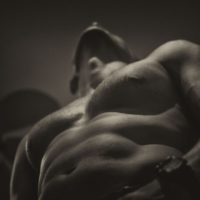Understanding Post-Workout Muscle Soreness, Part 1
Why does post-workout soreness occur?
People who lift weights on a regular basis know the feeling well. The pain often manifests twelve to twenty four hours after a heavy or intense workout. It affects all or nearly all of the major muscle regions that were used during the heavy workout… And the pain can be intense, too!
Delayed-onset muscle soreness or post-workout soreness is exceedingly common in the bodybuilding world. There are even “spray on” painkillers for people who can’t stand going about their day with stiff muscles. Many pop oral painkillers to eliminate the feeling but usually, the pain stays as long as it wants to.
It is believed that post-workout soreness can be caused by any or all of the following:
1. Intense exercise
2. Heavy resistance/load on the muscles.
3. Micro-damage in the muscles, which encourages the body to enlarge and strengthen the muscle tissues
4. Improper form during execution of exercises
5. Insufficient or no warm up exercises
Should you feel post-workout soreness every time you workout?
The simple answer to this essential question is no, you don’t have to feel intense pain every time you lift weights in the gym. Pain during a workout should be expected if you’re lifting near your maximum or if you’re working out for extended periods of time.
There is also a big difference between mild to moderate pain indicative of normal muscle development and extreme pain brought about by torn muscle or damaged ligaments.
Normal post-workout pain is often described as a dull pain that stays with you for a few days and disappears gradually until you barely remember that you had pain in the first place.
Injury-related pain is a class of its own. Muscle, joint or ligament injuries can generate a variety of pain signals from stabbing pain, gnawing pain or extreme, radiating pain that affects more than one spot or region.
Depending on the severity of the injury, the pain can fade on its own or it can intensify until it becomes unbearable and you need to rush to your physician for help.
As we’ve already discussed in previous posts, you have to be accustomed to pain if you want to make any real progress. Minor pain is actually a sign that your muscles are repairing themselves and your muscle tissues are becoming stronger and bigger.
The slogan “no pain, no gain” applies perfectly to bodybuilding. Every milestone that you will be forever proud of is marked with some pain. The pain won’t be intense, but you will feel it nonetheless!
Who experiences post-workout pain?
All weightlifters experience some level of pain or discomfort after a workout. However, it is the novice bodybuilders who often experience the most intense post-workout pains. The reason for this is quite simple: novice bodybuilders have yet to develop strong muscles in all of the frequently used regions of their bodies.
If you’re a novice bodybuilder yourself, you will continue experiencing notable post-workout pain/soreness until such time that your body has become accustomed to the strain and load of weightlifting.
Some beginners experience severe post-workout soreness for several months while some only suffer intense muscle pain in the first two to three months of regular workouts.
Eventually, the intense bouts of pain will disappear and you will be able to progress to heavier weights without worrying about pain 24 hours after the heavy workout.
Is there a relationship between progress and post-workout pain?
Technically speaking, yes there is a relationship between the two. You see, moderate pain is your body’s way of telling you that great things are happening to your muscles.
In a way, pain is a sign that your workout is still helping your body develop.
If you experience absolutely no pain after a workout and soreness has become a thing of the past, it is possible that your body has fully adapted to your workout regimen and it is no longer changing to deal with the strain.
What usually follows is the dreaded “plateau”.
A plateau can affect a bodybuilder in two ways. First, it can result in regaining a small or moderate amount of body fat. This can be disastrous if you’re just starting to get the proper striations in your various muscle groups.
Second, a plateau can also halt your mass gains. Gaining additional muscle size and definition is heard enough – it can be doubly difficult if your body is no longer challenged by your workouts. Your muscles will not shrink or “turn into fat” but don’t expect any large gains any time soon!



